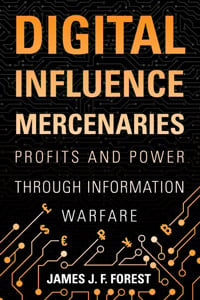Digital Influence Mercenaries: Profit and Power through Information Warfare
Digital Influence Mercenaries. By James J.F. Forest. Naval Institute Press; www.usni.org/press/books; 245 pages; $39.95.
 In Digital Influence Mercenaries: Profits and Power Through Information Warfare, James Forest guides readers through the world of those who would use untruths to win over adherents to various ideologies and, coincidentally, make money by doing so. He often refers to it as the influence industry.
In Digital Influence Mercenaries: Profits and Power Through Information Warfare, James Forest guides readers through the world of those who would use untruths to win over adherents to various ideologies and, coincidentally, make money by doing so. He often refers to it as the influence industry.
Forest is insightful and well-versed in describing and explaining the fears and psychological needs that “influence mercenaries” exploit in the digital age.
The topics Forest covers in clarifying detail include the varied landscape and methods of the mercenaries, the global pervasiveness of uncertainty, comforting lies, confirmation bias, collective identity and conformity, echo chambers, and filter bubbles. He concludes with recommendations for confronting the future challenges posed by the mercenaries.
The most disturbing practice for this reviewer is the crafting of filter bubbles. This tool perceives interests, based upon any online searches or entries, and then promotes products and services gleaned from a user’s “likes.” More broadly, one definition of a filter bubble describes it as “a situation in which an Internet user encounters only information and opinions that conform to and reinforce their own beliefs, caused by algorithms that personalize an individual’s online experience.”
A disappointing aspect of the book is the revelation of an apparent political bias. Despite a small number of statements apparently lauding nonpartisanship and evenhandedness, the bulk of the numerous examples of digital influence mercenaries trafficking in lies and falsehoods cite individuals and institutions known to occupy the conservative end of the current political spectrum. Conversely, nearly all examples of truth champions—elevating fact- and science-based statements that must never be questioned—cite individuals and institutions that were formerly considered independent but are now usually associated with the other end of the spectrum.
Observing these patterns, one is reminded that in this highly partisan age perceived cases of disinformation—a term increasingly used in recent years—seem too often employed to stifle opinions voiced by political or ideological opponents.
Still, since essential values, such as credibility and free speech, seem to be losing trust and respect in many quarters, this book should occupy a space on the shelves of any security professional for its educated contribution to the current literature that helps us encounter, assess, and defeat emerging informational threats.
Reviewer: James T. Dunne, CPP, is a member of the ASIS Communities for Extremism and Political Instability and for Information Technology Security. He is a senior analyst in the U.S. State Department’s Bureau of Diplomatic Security. The views expressed here are those of the reviewer and do not necessarily reflect those of the U.S. Department of State or the U.S. government.













